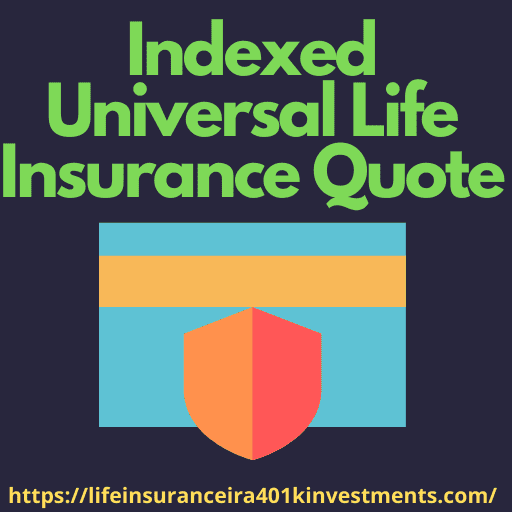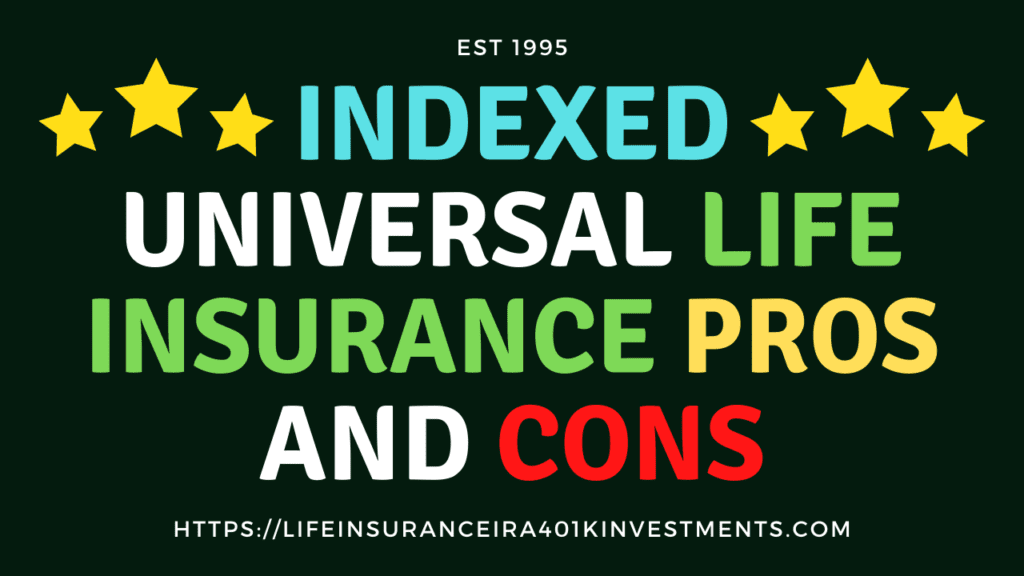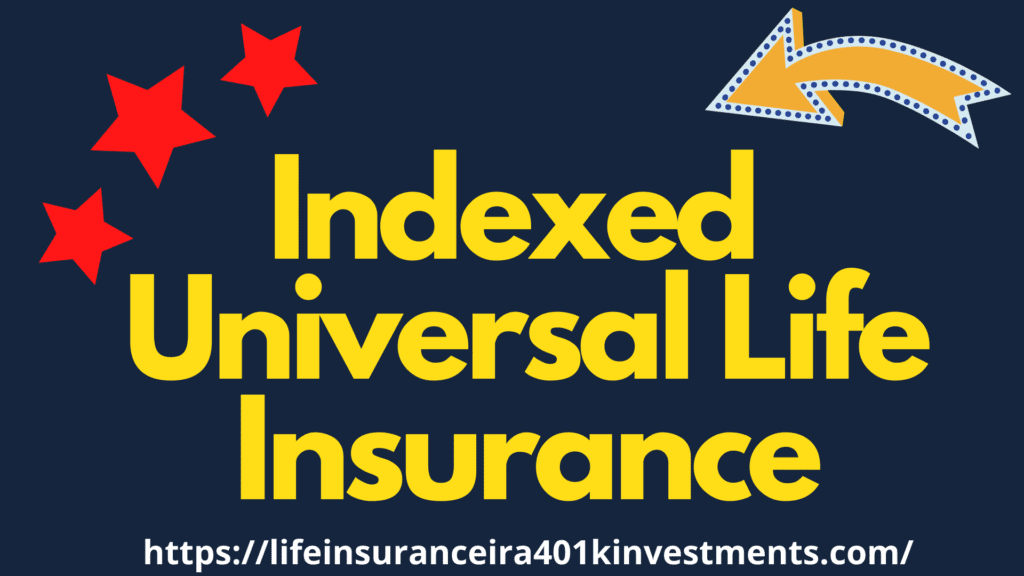Indexed Universal Life Insurance Pros and Cons
The indexed pros and cons of Universal Life are generally overstated. By either party with the intention of selling or opposing an IUF policy. This long article explains what IUF is and how IUF works. And the advantages and disadvantages of an indexed universal life policy.

In creating this post, we analyzed all the pros and cons of IUF. We were able to find that on Google and YouTube to address them fully. Other topics like IUF, IUF vs. Whole Life, and IUF vs. 401k fees are discussed below.
Indexed Universal Life Insurance Pros and Cons
Indexed universal life insurance plans are an interesting twist on traditional universal life insurance.

Pros of Indexed Universal Life:-
- Death Benefit – (AKA Family Protection)
- Cash Value
- Flexible Premiums
- Locked-in Gains & Annual Reset
- No Required Distributions or Penalties for early access
- Is it Tax-Deferred or Tax-Free?
- Excellent Growth Potential
- Doesn’t Impact Social Security
Cons of Indexed Universal Life:-
- 0% Returns WILL Reduce your Cash Value
- Cost of Insurance Increases as you Age
- Net Amount of Risk
- The S&P Index Crediting does NOT include Dividends
- There is a Crediting Cap
- You Don’t Keep “Excess” Returns
- It’s Complicated
In summary, the premiums paid go to the cost of life insurance.
Translation results
The prices and the rest at the present value of the policy. The twist is that present value pays a rate of return based on increases in a capital index. Like the S&P 500 versus a fixed tariff like standard universal life insurance plans.
If you’re considering indexed universal life insurance, you’re probably already familiar with the details of universal life insurance. instead skip an in-depth look at these plans and review some of the pros and cons you should consider in your decision.
Pros
- Growth in cash value with deferred taxes.
- No contribution limit to policy contributions can make them attractive for tax purposes due to tax-deferred growth.
- Exposure to stock indices may offer better long-term growth compared to other universal life plans.
- Premiums may be lower than traditional universal life insurance plans.
- Lower risk than investing in stocks, as the cash value will not decrease if the target index falls.
- It can offer better returns than other universal plans in a solid stock market.
Cons
- Since the insurer makes money by holding a portion of the earnings, the returns will always follow the index.
- You can pay lower returns than other universal life plans in a poor stock market environment.
- Depending on your situation, the total costs paid can generate. Less long-term benefits compared to other insurance and separate investment alternatives.

What you commonly find when searching about Indexed Universal Life:
When I’m looking for the pros and cons of Indexed Universal Life. I constantly find extremely skewed information from one of these 3 sources:
- Life insurance agents who strongly favor IUL, who only seem to share the good and benefits of Indexed Universal Life.
- Life insurance agents who strongly favor Whole Life (vs. IUL), who only exaggerate the bad and disadvantages of indexed universal life insurance to fit their agenda.
All this results in complete confusion for the consumer. Rather than really understanding how Indexed Universal Life works. You have to count the various opinions you come across and hope you’re on the right side of the camp.
Pros of Indexed Universal Life
Death Benefit – (AKA Family Protection)
This is an insurance product and ultimately what you are insuring (your life) is of utmost importance.
Money can never replace the loss of a loved one. However, it is important to avoid the double blow of a family death and massive financial hardship.
All life insurance products have a death benefit, so it might seem strange to talk about it like a professional. But finally it is the key product that is being purchased so it should not be discounted.
The death benefit provides financial leverage, especially in the early years of the policy.
Cash Value
An IUF is a cash value life insurance policy. This means that it has a cash value and allows for the growth of cash accumulation within the policy.
This is a clear advantage of permanent living over temporary living, and part of the reason Why an IUL is more expensive than term, at least initially.
The present value grows over time as the person pays the IUF policy. People can always access the cash value and use it as you like to buy items. Such as real estate or stocks.
And don’t forget that you can also access your tax-free account growth by taking out a life insurance policy loan. (sometimes called a swap loan) against your cash value.
Cash value can be used to help pay for long-term care costs. Some IUF contracts also offer long-term care insurance.
Given the rising cost of long-term care, a hybrid policy could be a good option.
For those who have to invest a lot of extra money each year, there is a limit to the amount you can pay for the policy (generally a percentage of the total value of the policy). This limit is known as the modified MEC limit (foundation contract).
Flexible Bonuses
With convertible insurance, you have to pay your premium every month. If you stop paying, your policy will expire. There are a few exceptions, but it’s pretty rigid.
Indexed universal life insurance gives you the option to pay more or less each month (there is a minimum to cover fees and a maximum based on the MEC limit) But the policy has much more premium flexibility than the other types of life insurances. market policies.
The flexibility of an IUF is great for those whose incomes fluctuate throughout the year.
When you work on contract and certain times of the year are much better than others. As an individual the want to consider the flexible premium options available with an IUL policy.
Locked earnings and annual reset
There is no compulsory distribution on an IUF when preparing for retirement.
If you have an IRA or the annoying 401 (k). You should start making payouts (withdrawals) when you turn 70 1/2 years old.
Instead, the senior life insurance company buys options. On the market index. Giving an opportunity to make money when the stock market goes up and helps avoid losing it when the market goes down.
In reality, the company still loses the “option price”. But that’s part of the cost of insurance each year and it’s a fixed cost.
The annual reset may not seem like much at first, but it’s actually a big problem.
What it means is that it always starts from scratch every year. You never have to fight to “catch up” due to past losses.
No early access distributions or penalties required
When getting ready to retire, there is no mandatory distribution on an IUL.
As an owner IRA or the annoying 401 (k). You should start taking distributions (withdrawals) when you turn 70 1/2.
I’m sure you already know that. However, the reason for this mandatory withdrawal is due to the IRS. This money cannot be taxed until 401,000 withdrawals have been made.
Now, if you’re trying to build your retirement account while you or your spouse are still working. These mandatory distributions can seriously delay your progress. The IUF does not have this mandatory distribution requirement.
You can also access the present value of your policy through a tax-free loan or retirement.
(If you have a 401k investment) and are still working after reaching retirement age, you can delay payouts. But only until you stop working then it will be required.)
Is it Tax Deferred or Tax Free?
The IUL is a tax deferred policy. Similar to that of a 401 (k) or IRA, but different in many important ways. (some of which we have already mentioned above).
If you choose to increase your cash value in an IUL policy and use protection during your working years. The policy will act much the same as other tax-deferred products.
The cash value will grow and you will not pay growth tax on the cash value.
Please note, however, that if you close the account (not recommended) or make withdrawals. Instead of index universal life insurance vs 401k policy loans, you will pay growth tax.
However, unlike IRA and 401k investment accounts, you can borrow against the IUL cash value tax-free without incurring penalties.
Cons of Indexed Universal Life
As much as we have mentioned the many advantages of IUL insurance, there are also some disadvantages to ponder. Below we list our top 7 disadvantages of IUL insurance.
0% returns will reduce your cash value
One of the great selling points of Indexed Universal Life’s policy is the fact that it never loses cash value. Because there is a 0% (sometimes 1%) floor.
The reality is that the cost of insurance in the early years can be significant and therefore you may see your cash value decrease. (i.e. you may lose money) if you have been paying close to the minimum premium each month.
In the early years it is recommended that you do what you can to pay the maximum life insurance premium. Doing this in the early years, when your cash value is low, will help the ball roll and accelerate momentum.
One of the benefits of an cheap life insurance policy is the flexible premium. But if you consistently pay the minimum premium, the downtime will definitely be a big kick in the pants. And you’ll be disappointed by the cash value of the policy. This can also initiate a snowball effect as the cost of insurance increases as you get older.
Simply put, do your best to keep up with premiums in the early years.
The Cost of Insurance Increases as You Get Older
The cost of insurance is based on your age, your rating, and the amount insured.
For every $ 1,000 death benefit there is a cost that increases each year as you age. The reason the cost increases is because it is more likely to die.
Whole life insurance works by averaging the total cost of life insurance and provides a fixed premium. Get learn more about indexed universal life insurance pros and cons.
IUL policies have an increasing cost of the senior life insurance rate. This means that it is cheaper in the beginning and more expensive in the future.
Competent insurance agents don’t try to sell you a product that expires in your old age due to crazy expenses. Yes, it can happen, but that should not be the intention of the competent indexed universal life agent.
The intention of an IUL policy is to gradually. Decrease the “net amount of risk” (as seen by the insurance company), as you age.
A properly designed IUL policy is one that provides enough cushioning. In the early years to protect your policy from future COI increases.
Net Amount of Risk
In most IUL policies, the death benefit is equal to the original insured amount less the cash value.
In other words, if you purchased a $ 500,000 policy and had $ 200,000 in cash at the time of your death. Your beneficiaries would receive a check for $500,000, not $700,000.
This means that the insurance company only had to pay $300,000 at the time of his death. Because he had accumulated $200,000 in cash during the life of the policy.
All this to say that as you age the cost for every $1000. Of death benefit increases, but so should your cash value.
Therefore, the risk to the insurance company is relatively the same.
You have a higher risk of dying because you are higher. But they also have a lower amount of risk, so the two should be balanced.
Everything is fine and good if things go as expected. But if you pay the minimum, and the policy is struggling because there are a few bad years to start. You may find yourself with very little cash value to offset the rising cost of insurance associated with your age.
You can always call and lower your death benefit, but that’s obviously not something most people want to face.
Accreditation of the S&P index does NOT include dividends
In order for the universal life insurance company to grant you a 0% floor for downside protection. And also to give you an edge, the insurer has to buy options.
These options are not the same as buying the underlying shares. That these indexed universal life insurance pros and cons options represent.
As a result, the company does not earn the dividends that a stock owner would legitimately earn.
In other words, you will earn less than the index because you don’t get the dividends.
In some years this may be a difference of 1% in the index. And in other years it may be as high as a difference of 4%.
But it is useful to know that you will never get the same rate of return as the index itself.
In fairness, almost all asset managers don’t get the same rate of return. As the index, but that’s another completely different point.
There is an Accreditation Limit
IUL insurance has a great advantage because the life insurance company is buying options at a given rate. However, they do limit the amount of the credit to limit the upside potential. So in years where there is a 22% rate of return, you will only be credited for the maximum rate, or limit rate, associated with your policy.
Capitalization rates are usually between 9 and 14% (although there are accounts available with certain insurers).
Having your upside potential limited by a limit can be frustrating if you are watching your equity portfolio skyrocket. And want to engage in some of that action with your IUL.
Credit limits are just the cost of doing business with an IUL policy. If you don’t like it, you’d better have a Universal Variable policy. Or other investment product that fully participates in the stock market.
It is likely that after understanding all these pros and cons of Indexed Universal Life insurance. You know more about how Indexed Universal Life works than most of the sources you will find while searching the Internet.
Cheap Life Insurance Benefits
Universal life insurance plans, including indexed universal life, frankly, are not good options for the vast majority of people. There are some tax benefits. But they are almost only of real value to high-income / high-income workers or business owners. Indexed Universal Life Insurance Pros and Cons and often cost too high with potential returns. Too low for the tax benefits they provide.
There are other disadvantages, including limits on potential returns that can make it bad for the average person to build long-term wealth and have adequate life insurance. Compared to separate investment accounts and life insurance policies.
In short, like any financial instrument, what makes sense to a person may not be right for you. Take the time to understand the benefits and the risks. As well as to carefully analyze the alternatives that may be more suitable.
Before you buy complicated cheap life insurance products, like universal and index life insurance. Be sure to take full advantage of other tax-deferred investment alternatives, like traditional or Roth IRAs.
First combined with independent term life insurance. For most people, this will be a more affordable option and potentially a better long-term value.
Get Indexed Universal Life Insurance Pros and Cons. Get compare quotes rates in just 2 minutes.

